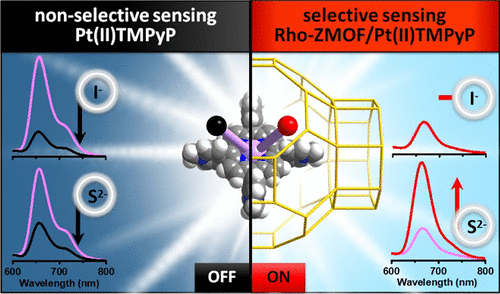


The selectivity and sensitivity of sensors are of great interest to the materials chemistry community, and a lot of effort is now devoted to improving these characteristics. More specifically, the selective sensing of anions is one of the largest challenges impeding the sensing-research area due to their similar physical and chemical behaviors. In this work, platinum–metalated porphyrin (Pt(II)TMPyP) was successfully encapsulated in a rho-type zeolite-like metal–organic framework (rho-ZMOF) and applied for anion-selective sensing. The sensing activity and selectivity of the MOF-encaged Pt(II)TMPyP for various anions in aqueous and methanolic media were compared to that of the free (nonencapsulated) Pt(II)TMPyP. While the photoinduced triplet-state electron transfer of Pt(II)TMPyP showed a very low detection limit for anions with no selectivity, the Pt(II)TMPyP encapsulated in the rho-ZMOF framework possessed a unique chemical structure to overcome such limitations. This new approach has the potential for use in other complex sensing applications, including biosensors, which require ion selectivity.